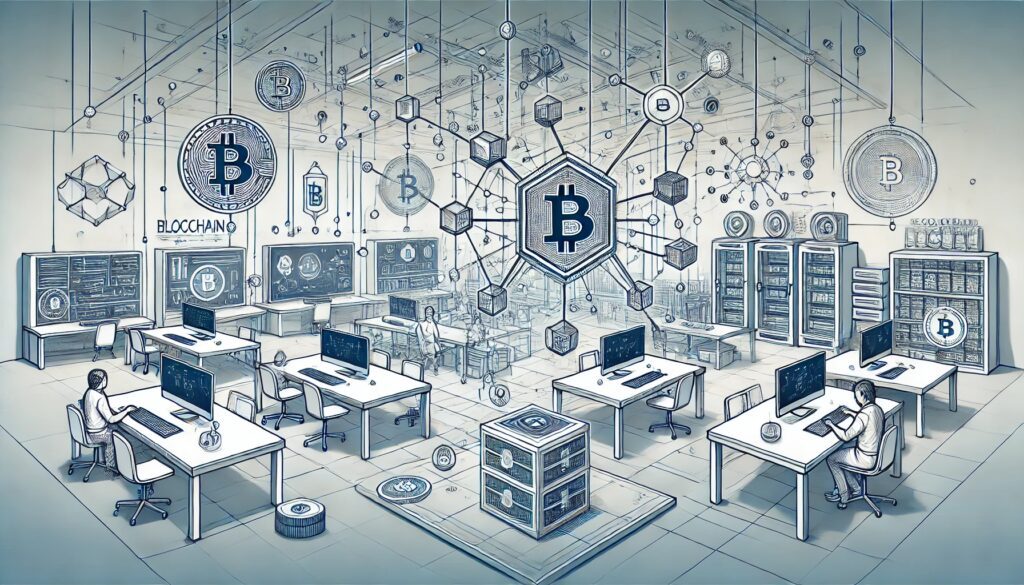
Blockchain and cryptocurrencies are transforming the digital landscape at an unprecedented pace. From the development of new applications to innovative uses in various industries, the potential of these technologies is limitless. Let’s delve into the latest trends, developments, and future prospects that are shaping the blockchain and cryptocurrency realm in 2024.
The Rise of Blockchain Applications
Decentralized Finance (DeFi) Expansion
Decentralized Finance (DeFi) is revolutionizing the financial sector by providing financial services without intermediaries. In 2024, DeFi is expanding rapidly, offering lending, borrowing, and trading platforms that are more accessible and transparent. This shift not only democratizes finance but also enhances security and efficiency in financial transactions.
Vitalik Buterin, co-founder of Ethereum, emphasizes the potential of DeFi in democratizing financial services. He notes, “DeFi provides access to financial services for millions who are unbanked or underbanked. It’s about giving people control over their own assets without relying on traditional banks.”
Caitlin Long, CEO of Avanti Financial Group, points out that DeFi could disrupt traditional financial systems by offering more efficient and transparent alternatives. She mentions, “DeFi protocols are making financial transactions more efficient and transparent, which can significantly reduce costs and increase accessibility.”
Supply Chain Management
Blockchain’s decentralized and transparent nature makes it an ideal solution for supply chain management. By ensuring the traceability and authenticity of goods, blockchain can significantly reduce inefficiencies and fraud in global supply chains. This year, more companies are adopting blockchain to enhance the integrity of their supply chain processes.
Don Tapscott, co-founder of the Blockchain Research Institute, sees blockchain technology as transformative for supply chain management. He states, “Blockchain ensures traceability and authenticity of goods, reducing fraud and increasing efficiency in supply chains.”
Sunny Lu, CEO of VeChain, highlights the practical applications of blockchain in tracking and verifying the authenticity of products. He says, “By using blockchain, companies can track products from origin to consumer, ensuring transparency and reducing counterfeiting.”
Digital Identity Verification
Digital identity verification is becoming crucial in our increasingly digital world. Blockchain technology offers a secure and decentralized way to verify identities, reducing the risk of identity theft and fraud. This is particularly important for industries such as healthcare and finance, where secure identity verification is paramount.
Charles Hoskinson, founder of Cardano, believes that blockchain-based digital identity verification can address significant security and privacy issues. He explains, “Blockchain provides a secure and decentralized method for verifying identities, which can help reduce identity theft and fraud.”
David Birch, an author and advisor on digital financial services, adds, “Digital identity verification through blockchain can streamline processes in various industries, from healthcare to finance, ensuring that personal data remains secure.”
Healthcare and Data Security
In the healthcare sector, blockchain technology is being used to securely store and share patient records. This ensures that sensitive data is protected from unauthorized access while still being easily accessible to authorized personnel. The immutable nature of blockchain records also ensures data integrity, which is critical for patient care.
Innovations in Smart Contracts
Automated Payment Systems
Smart contracts are self-executing contracts with the terms of the agreement directly written into code. These contracts can automate payment systems, ensuring that payments are made only when certain conditions are met. This reduces the need for intermediaries and increases transaction efficiency.
Escrow Services
Blockchain-based escrow services use smart contracts to hold funds until all parties meet the agreed-upon conditions. This provides an additional layer of security for transactions, making it particularly useful for real estate and large financial transactions.
Real Estate Transactions
The real estate sector is also benefiting from blockchain through smart contracts that automate property transactions. These contracts can handle everything from escrow to the transfer of ownership, streamlining the entire process and reducing the potential for fraud.
Nick Szabo, a pioneer of smart contracts, underscores their potential to automate and secure transactions. He notes, “Smart contracts reduce the need for intermediaries, automate transactions, and ensure that contract terms are executed exactly as coded.”
Sergey Nazarov, co-founder of Chainlink, emphasizes the importance of reliable data for smart contracts. He states, “For smart contracts to be truly effective, they need access to reliable, real-world data, which is where oracles play a crucial role.”
Emerging Blockchain Trends in 2024
Blockchain as a Service (BaaS)
Blockchain as a Service (BaaS) is becoming increasingly popular as companies like Microsoft and Amazon offer blockchain solutions that businesses can adopt without developing their own blockchain infrastructure. This service model is expected to grow, making blockchain more accessible to a wider range of industries.
Gartner, a leading research and advisory company, predicts that Blockchain as a Service (BaaS) will become increasingly popular as businesses look for cost-effective ways to implement blockchain technology. They note, “BaaS offers a scalable solution for businesses to adopt blockchain without investing heavily in infrastructure.”
IBM Blockchain highlights that BaaS can accelerate blockchain adoption across various industries. Their experts state, “By offering blockchain solutions as a service, we enable businesses to leverage the technology’s benefits quickly and efficiently.”
Interoperability and Cross-Chain Solutions
Interoperability between different blockchain networks is crucial for the technology’s future. In 2024, we see significant advancements in cross-chain solutions that allow different blockchain networks to communicate and interact seamlessly. This interoperability is essential for the growth and integration of blockchain technology across various platforms and industries.
NFTs and the Metaverse
Non-Fungible Tokens (NFTs) continue to gain traction, extending beyond digital art to areas like gaming, real estate, and music. The concept of the metaverse, a virtual world where users can interact and transact, is also expanding with the help of blockchain technology. NFTs play a crucial role in this by providing a way to own and trade virtual assets securely.
Beeple, a digital artist known for his NFT sales, believes that NFTs will continue to revolutionize ownership and provenance in the digital world. He says, “NFTs provide a way for artists to sell their work directly to consumers, ensuring authenticity and ownership.”
Matthew Ball, a venture capitalist and metaverse expert, predicts that the metaverse will integrate deeply with blockchain technology. He explains, “The metaverse will rely on blockchain to manage digital assets, identities, and transactions, creating a seamless and secure virtual environment.”
Green Blockchain Initiatives
Environmental concerns are driving the development of green blockchain initiatives. These initiatives aim to reduce the energy consumption associated with blockchain technology, making it more sustainable. Innovations like proof-of-stake (PoS) and other energy-efficient consensus mechanisms are gaining popularity as they offer a more eco-friendly alternative to traditional proof-of-work (PoW) systems.
Elon Musk, CEO of Tesla, has highlighted the importance of making blockchain more sustainable. He mentions, “As blockchain technology grows, it’s essential to develop more energy-efficient solutions to minimize environmental impact.”
Vitalik Buterin also supports the transition to more sustainable blockchain technologies, advocating for the adoption of proof-of-stake (PoS) mechanisms over the traditional proof-of-work (PoW) systems.
Cryptocurrency Trading Bots and Analysis
Algorithmic Trading
Algorithmic trading bots are becoming more sophisticated, utilizing advanced algorithms to execute trades at high speeds and frequencies. These bots can analyze market trends and make split-second decisions, maximizing profits while minimizing risks.
Machine Learning Models
The integration of machine learning models in cryptocurrency trading is enhancing the ability to predict market movements. These models can analyze large datasets to identify patterns and trends, providing traders with valuable insights that can inform their strategies.
Real-Time Data Processing
In the fast-paced world of cryptocurrency trading, real-time data processing is essential. Advanced trading bots can process and act on real-time market data, allowing traders to capitalize on opportunities as they arise.

Future Prospects and Challenges
Regulatory Compliance
As blockchain and cryptocurrency technologies evolve, so too does the regulatory landscape. Ensuring regulatory compliance is crucial for the widespread adoption of these technologies. Governments and regulatory bodies are working to create frameworks that balance innovation with security and consumer protection.
Security and Privacy
While blockchain technology offers enhanced security, it is not immune to threats. Ensuring the security and privacy of blockchain networks is an ongoing challenge that requires continuous innovation and vigilance. The development of new security protocols and privacy-preserving technologies is critical for the future of blockchain.
Scalability
Scalability remains a significant challenge for blockchain technology. As the number of users and transactions increases, so does the need for scalable solutions that can handle high volumes of data without compromising performance. Innovations in layer 2 solutions and other scalability techniques are essential to address this challenge.
Frequently Asked Questions (FAQ)
What is the future of blockchain technology?
Blockchain technology is poised for significant growth, with applications extending far beyond cryptocurrencies. Experts predict advancements in areas such as decentralized finance (DeFi), digital identity verification, supply chain management, and more. Innovations like smart contracts, NFTs, and green blockchain initiatives are expected to drive further adoption and integration across various industries.
How is blockchain transforming supply chain management?
Blockchain technology enhances supply chain management by ensuring the traceability and authenticity of goods. By providing a transparent and immutable ledger, blockchain reduces fraud and increases efficiency in supply chains. Companies can track products from origin to consumer, ensuring transparency and reducing counterfeiting.
What are the benefits of blockchain-based digital identity verification?
Blockchain-based digital identity verification offers a secure and decentralized method for verifying identities. This reduces the risk of identity theft and fraud while streamlining processes in various industries, from healthcare to finance. Blockchain ensures that personal data remains secure and accessible only to authorized personnel.
How do smart contracts work, and what are their benefits?
Smart contracts are self-executing contracts with the terms of the agreement written directly into code. They automate transactions and ensure that contract terms are executed exactly as coded. This reduces the need for intermediaries, increases efficiency, and enhances security in transactions.
What is Blockchain as a Service (BaaS), and why is it important?
Blockchain as a Service (BaaS) allows businesses to adopt blockchain technology without developing their own infrastructure. Companies like Microsoft and Amazon offer BaaS solutions that provide a scalable and cost-effective way to implement blockchain. BaaS accelerates blockchain adoption across various industries by making it more accessible.
What role do NFTs play in the digital world?
Non-Fungible Tokens (NFTs) provide a way to own and trade digital assets securely. They ensure authenticity and ownership, making them valuable in areas like digital art, gaming, and the metaverse. NFTs revolutionize ownership and provenance in the digital world by offering a unique way to buy, sell, and trade digital creations.
How are green blockchain initiatives addressing environmental concerns?
Green blockchain initiatives aim to reduce the energy consumption associated with blockchain technology. Innovations like proof-of-stake (PoS) mechanisms offer more energy-efficient alternatives to traditional proof-of-work (PoW) systems. These initiatives make blockchain more sustainable and environmentally friendly.
Conclusion
The future of blockchain and cryptocurrency is bright, with innovations and trends that promise to revolutionize various industries. From the rise of DeFi and NFTs to the adoption of green blockchain initiatives and the development of advanced trading bots, the potential of these technologies is immense. As we navigate the challenges and opportunities of this digital frontier, one thing is clear: blockchain and cryptocurrency are here to stay, driving the next wave of technological innovation.
Stay ahead of the curve and explore how blockchain technology can transform your business today!
For more information on the latest trends and developments in blockchain and cryptocurrency, check out these sources:




